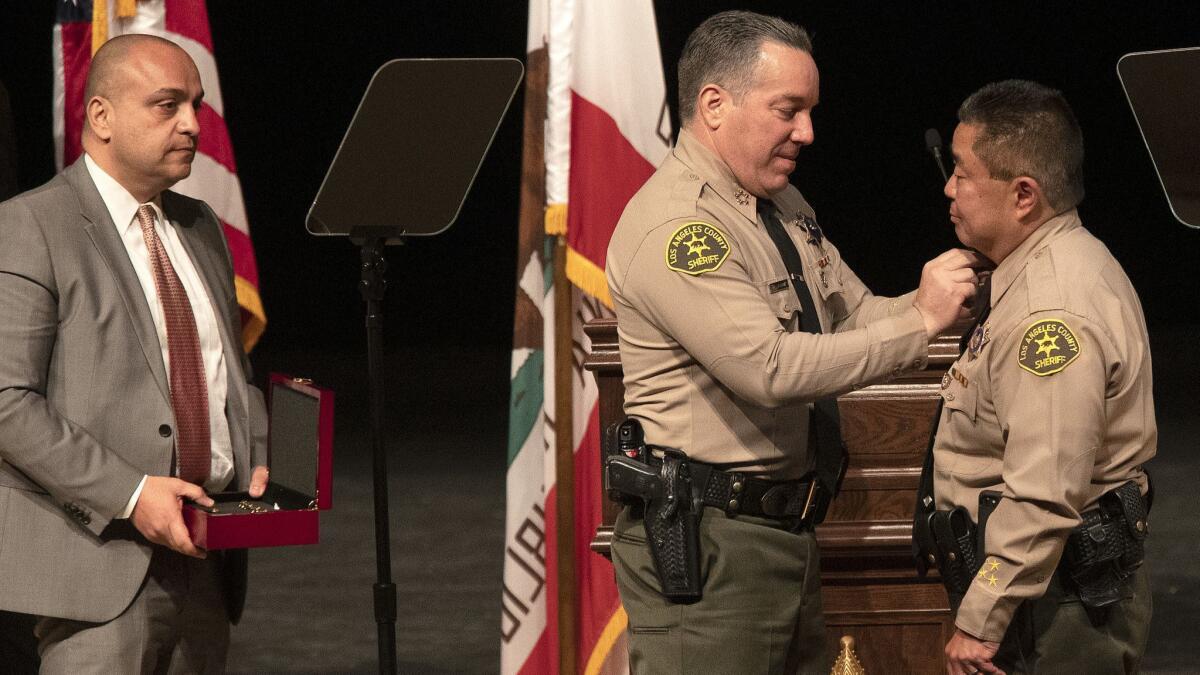Editorial: The battle is on between Sheriff Alex Villanueva and the L.A. County supes

- Share via
It’s finally on, for real, between Sheriff Alex Villanueva and the Los Angeles County Board of Supervisors, and that’s both bad and good.
It’s bad because the battle that broke open last week over whether Deputy Caren Carl Mandoyan is entitled to his job, his pay, his gun and his badge is a needless and embarrassing dispute, brought on by a blundering and inexperienced sheriff with a knack for alarming even his own allies and colleagues. And it’s good because as unnecessary as the Mandoyan fight is, the questions it raises are fundamental: Is the independently elected sheriff a free agent with unfettered control over who wears the deputy uniform and enforces California law? Or does the board have the final say? Or if the board and the sheriff are part of an interlocking system of checks and balances, how exactly is it supposed to work?
These are questions that are likely to draw attention not just in L.A. but around the state, where 57 other elected county sheriffs jealously guard the powers inherent in an odd, outdated position in which they serve with little oversight except on election day. A hearing is set for Tuesday.
Mandoyan was fired in 2016 by then-Sheriff Jim McDonnell on allegations of domestic abuse against another deputy. The Civil Service Commission upheld the firing on May 23 last year.
As unnecessary as the Mandoyan fight is, the questions it raises are fundamental.
But then Villanueva — with key campaign assistance from Mandoyan and strong backing from the deputies’ union — defeated McDonnell in the Nov. 6 election and reinstated the ousted deputy. The Board of Supervisors expressed its displeasure but otherwise took little action until mid-February, when they told the sheriff to dismiss Mandoyan.
When Villanueva declined, the county’s accountant informed him that he was off the payroll as of Feb. 22 and is “instructed to immediately turn in any and all County property,” including his weapon and badge.
Villanueva countered that it was an ongoing dispute, leaving us with this conceivable yet manifestly intolerable prospect: a uniformed sheriff’s deputy continuing to patrol with gun and badge who is nevertheless not a county employee.
Last Tuesday, in an off-the-agenda meeting with the board (California public meeting laws notwithstanding), Villanueva and an aide engaged in what the sheriff later called “an exchange of information” with the board.
On Wednesday, Villanueva without explanation began a news conference by reading several lines of department policy on workplace violence and sexual harassment — an apparent attempt to correct the backward impression he had made several weeks earlier when he told the board that Mandoyan’s accuser had waited too long to report the assault against her.
He also told reporters that the supervisors and an oversight commission had “conflagrated” two issues — domestic violence and reinstatement after wrongful termination — and that is perhaps one way to put it, although in fact it was Villanueva who conflated those issues when attempting to explain why he purportedly reinstated Mandoyan.
He is correct, though, that the critical issue of domestic violence among law enforcement officers is distinct from the question of whether he has the authority, independent of the Board of Supervisors, to reinstate a fired deputy.
Those questions, in turn, are distinct from an equally crucial matter that he has raised and the board so far has evaded: the practical impact of an Employee Relations Commission decision reverting the Sheriff’s Department to discipline guidelines as they existed in 2012 under Sheriff Lee Baca.
Enter the Fray: First takes on the news of the minute »
The panel threw out a set of tougher penalties for deputy misconduct that Baca put in place in 2013 in the wake of a jail violence scandal, and another set put in place by McDonnell in 2016, because the sheriffs had imposed them without conferring with the deputies union — the same union that backed Villanueva in the recent election.
Under Villanueva’s interpretation of the ruling, Mandoyan may be only one of hundreds of terminated deputies who might be rehired, regardless of what they did to lose their badges in the first place.
So although Mandoyan’s employment status is important, he is just a symbol of the sheriff’s power to select his troops — and the union’s power to overcome the sheriff’s discipline. For that reason, the Board of Supervisors should waste no more time before understanding the Employee Relations Commission’s decision, challenging it in court if necessary and blocking the sheriff’s bizarre “truth and reconciliation” process. Otherwise, the county really could find itself conflagrated.
Follow the Opinion section on Twitter @latimesopinion and Facebook
More to Read
A cure for the common opinion
Get thought-provoking perspectives with our weekly newsletter.
You may occasionally receive promotional content from the Los Angeles Times.










